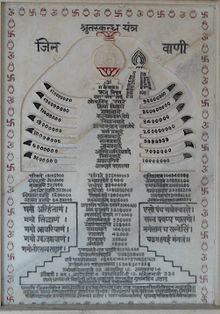Jinvani

| Jinvani | |
|---|---|
 Stela depicting Jinvani | |
| Information | |
| Religion | Jainism |
| Part of a series on |
| Jainism |
|---|
 |
In Jainism, Jinvani means the message or the teachings of the Jina (arihant).[1][2][3] It is made up of two words Jina (arihant) and Vani (voice). Often the words are spelled out separately or put together as "Jinavani" in publications.[4] It is depicted in various forms, such as "Jinwani" which may be a hymn (or a village in India, by coincidence), and is also personified as Jinvani Maa (Mother Jinvani). The omniscient form of Jina-Vani (relative to Kevala Jnana) is said to be a letterless speech, when emanating from an arihant, which is understandable by all present, in their own language, as it is transformed into lettered discourse.[5] In literature, discourses of the tirthankara (or jineshwar) are generally referred to as Jinvani (or Jin-Vaani), as well as Srutu Jnana (or Shrut Jnana), meaning scriptural knowledge.[6]
Depiction
[edit]There is a statue of Saraswati Devi, goddess of knowledge, having Jinvani in her hand on Lotus behind the Peacock in the Shantinath Jain Teerth. Likewise, she may be referred to as Jinavani, for presiding over Jaina scriptures.[7]
See also
[edit]Notes
[edit]- ^ Kāmakumāranandī (1998), Universal Message of Jainism, p. xi-xii, retrieved 7 September 2015
- ^ "Jaipur gets ready for Shrut Panchami Mahaparva - merinews Mobile". merinews.com. Archived from the original on 19 February 2019. Retrieved 15 August 2015.
- ^ "on www.jainsamaj.org ( Jainism, Ahimsa News, Religion, Non-Violence, Culture, Vegetarianism, Meditation, India. )", jainsamaj.org
- ^ "Jinavani". Book Search. Retrieved 3 December 2017.
- ^ "Atmanushasana (Discourse to the Soul)". Jain Dharma. Archived from the original on 5 December 2017. Retrieved 3 December 2017.
- ^ "Jin-Vaani". Jainism Simplified. 10 July 2014. Retrieved 3 December 2017.
- ^ Vensus A. George (2008). Paths to the Divine: Ancient and Indian. CRVP. p. 331. ISBN 978-1-56518-248-6.
